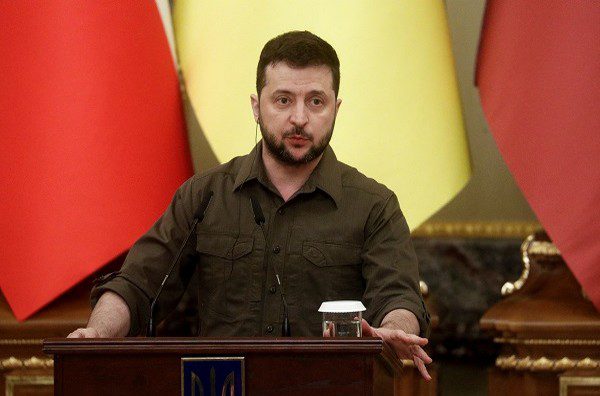Ukraine President Volodymyr Zelenskyy has written to Prime Minister Narendra Modi seeking additional humanitarian aid including medical equipment from India, the external affairs ministry said on Wednesday.
The request came during the recent three-day visit to India by Ukrainian Deputy Foreign Minister Emine Dzhaparova who handed over Zelenskyy’s letter to Union Minister of State for External Affairs Meenakshi Lekhi, a statement from the foreign ministry said.
“Dzhaparova also called on Minister of State for External Affairs and Culture, Meenakshi Lekhi. Besides holding discussions on a wide range of bilateral and international issues of mutual interest, she handed over a letter from President Zelenskyy, addressed to Prime Minister Modi. Ukrainian request for additional humanitarian supply, including medicines and medical equipment was also shared by her,” according to the statement released by the Ministry of External Affairs.
The statement read that the next Inter-Governmental Commission between New Delhi and Kyiv would be held in India on a mutually convenient date.
Both the ministers, Dzhaparova and Lekhi exchanged views on bilateral and global issues of mutual interest.
India has assured of providing enhanced humanitarian assistance to Ukraine. Following their meeting, MoS Lekhi took to her Twitter handle to reiterate what Prime Minister Narendra Modi said, during a bilateral meeting with Russian President Vladimir Putin in September last year that, “Today’s era is not of war.”
She tweeted, “Not a time for War – PM @narendramodi. Pleased to meet Ukrainian First Dy FM @EmineDzheppar. Exchanged views on bilateral and global issues of mutual interest. Cultural ties and women empowerment also figured in the discussion. Ukraine was assured of enhanced humanitarian assistance.”
Meanwhile, Dzhaparova also took to Twitter to post her thanks on Tuesday. “Had a fruitful meeting with @M_Lekhi. Briefed Minister on #Ukraine’s efforts to fight unprovoked aggression. Discussed deepening bilateral cooperation in various fields, in a particular culture. Bookshelves and audio guides under the patronage of @ZelenskaUA will be available soon in India,” she tweeted.
During her visit Dzhaparova held bilateral talks with Sanjay Verma, Secretary (West), MEA.
The bilateral agenda included – spheres such as economic, defence, humanitarian assistance, and global issues of mutual interest.
The Ukraine deputy foreign minister briefed Secretary (West) about the prevailing situation in Ukraine. The two sides agreed to hold the next round of Foreign Office Consultations in Kyiv on a mutually convenient date, according to a statement released by the MEA.
“The Ukrainian Deputy FM also proposed that rebuilding infrastructure in Ukraine could be an opportunity for Indian companies. Secretary (West) shared that India has provided medicines, medical equipment and would provide school buses etc. to Ukraine,” the MEA statement added.
Dzhaparova visited the Manohar Parrikar-Institute of Defence Studies and also delivered a talk at the Indian Council of World Affairs. During her visit, she highlighted Ukraine’s desire to build a stronger and closer relationship with India. (ANI)
Read More: http://13.232.95.176/



